#books set in India
Explore tagged Tumblr posts
Text
My Bookish World Tour- ASIA
12 done and 38 to go… YemenChinaSouth Korea JapanPhilippinesTajikistanUzbekistanKazakhstanKyrgyzstanNorth KoreaMalaysiaThailandMyanmarNepalBangladeshPakistanAfghanistanJordanCambodiaLaosVietnamTurkmenistanSri LankaIndonesiaBruneiArmeniaHong KongAzerbaijanBahrainCyprusEast TimorPalestineIranMaldivesTimor-LesteLebanonIraqSaudi ArabiaGeorgiaBhutanSingaporeIsraelKuwaitQatarOmanSyriaUnited Arab…

View On WordPress
#Agatha Christie#Andrew Fidel Fernando#around the world in books#book review#book set in pakistan#books#books set in asia#books set in India#fluttering feelings#Jamilia#Khalid Hosseini#Kyrgyzstan books#midnight&039;s children#Murakami#Not without my daughter#shashi tharoor#Sri Lankan books#Tamen de Gushi#unmarriageable
0 notes
Text

This is from the Wikipedia page of Encanto and apparently one of the discarded ideas was "following the story of multiple generations and Casita over a 100-year timespan;[26]: 49 "
Which okay, bad idea for a 90 minute movie but that would make a FANTASTIC BOOK!!!!!! You have the room to do that!
There are so many really, really great multigenerational family stories that are books. More please!
#ashleybenlove posts#Encanto#Because of one of the book clubs I'm in is focused on Latina authors#I read a lot of those#but I read one that was set mostly in India about Saint Thomas Christians
4 notes
·
View notes
Text
Book Review: Kaikeyi by Vaishnavi Patel
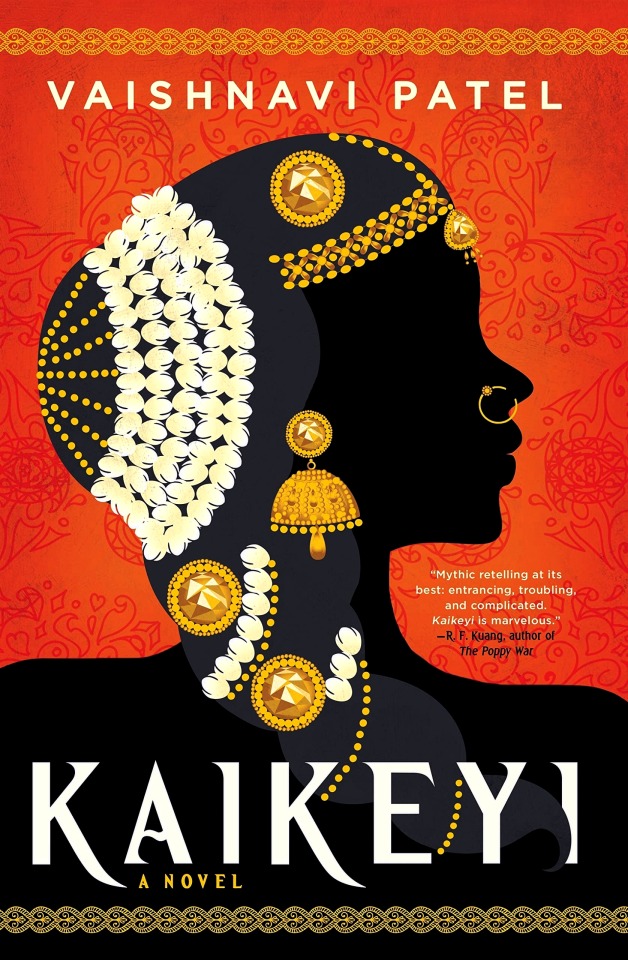
I ended up giving this book a 3/5 star rating based on just a craft perspective but as soon as I finished reading I ended up looking at reviews by Hindus online and well. Let's discuss below the cut.
So Kaikeyi is a retelling of the Ramayana from the perspective of Queen Kaikeyi. The Ramayana is a very important text in Hinduism and thus, assuming that Patel grew up in a Hindu household, one would expect her to be familiar with it in the same way I, as someone who grew up in a Catholic household, am familiar with the Bible.
Before I get into all of that, I would like to actually talk about the content of the book, since I am the target audience as an outsider to Hinduism looking to learn more about the stories that make up its foundations. I don't know anything about the Ramayana and I found this retelling to be very off, at least from a historical perspective.
One of the biggest issues I have with historical books is that authors really love to put their modern, 21st century views and ideals onto the narrative. It happens on all sides of the political spectrum and as a historian it makes me want to tear my hair out. I know it's unavoidable that our own perspectives shape how we write, but I wish that more people would take a step back and see how their ideas of feminism, in this case anyway, would actually have looked in the time period their book is set in.
Kaikeyi is the third wife of Dasharath and gives birth to his second son, Bharata, whom has been promised upon their wedding to ascend the throne. Kaushalya, Dasharath's first wife, also gave birth to his first son, Rama, of whom the Ramayana is actually focused on. However, while their children are growing up, we get a lot lot lot of the pushing of 21st century ideals in a historical setting. Kaikeyi is very invested in the ideas of women's rights which is fine? I guess? But it is very very hard for me to believe a woman of her standing, quite literally as the Queen of her nation, would be so class conscious and care this much about the average woman in her country without much reason.
Every single time Kaikeyi devolves into a rant about the Patriarchy and Feminism, it feels like this book would have been better suited to a modern retelling of the Ramayana rather than a historical one, though I can imagine it would still come with a lot of the same baggage re: an apparent lack of understanding of anything in the original Epic. The whole thing feels forced and like if Kaikeyi doesn't care about all women then she can't be a feminist character or reclamation or a "girl's girl" as the kids on tiktok are saying these days I think. Honestly I'd rather have a meaningful examination of her biases that are certain to actually be there if she were written to be like a person rather than a perfect ideal of Patel's feminism.
The first 2/3 of the book also felt like everything was just handed to Kaikeyi on a silver platter with very minimal pushback which just made her such an unbearable character to be in the headspace of for that period. I feel a lot of that space could have just been used better to show her stubbornness in the face of adversity that shines towards the end of the novel rather than just. Letting her passively have all of her goals handed to her with very minimal work on her part.
As a reading experience, the last 150 or so pages were probably the best to read as Kaikeyi's actions finally have real, tangible consequences for her but this is also the point where I saw a lot of Hindu readers had such an issue with this retelling of the Ramayana. Rama being portrayed as a misogynistic, war hungry prince and the erasure of Ravana's history of raping and kidnapping women were the two biggest points of contention for Hindu reviewers. I don't see why either of these changes were necessary to adapt this story for a modern, Western audience. By doing this, I believe Patel, intentionally or not, is playing into colonialist narratives about Hinduism rather than fighting them. It's also a disservice to present the Ramayana this way to both Hindu and non-Hindu readers, given that Hindus will be able to spot all the changes and disregard them, and non-Hindus are none the wiser to all the liberties Patel took with her retelling and are bound to spout them as fact if they don't look into the original.
I'd probably skip this book unless you're really into hashtag girlboss feminism retellings of fairy tales and myths, since so many of them miss the point of the original story. I can see the potential here for Patel as an author and am on the fence about trying her book coming out next month as the writing itself wasn't awful, but I'm not sure if I trust her with another myth retelling. At the very least, I suppose I can thank Patel for making me interested in reading the Ramayana at some point in the near future, so this review might have an update eventually.
#shay speaks#book reviews#bookblr#booklr#kaikeyi#i read this in like 3 weeks i'm kinda shocked#the prose reads very easily but its very insufferable to be in kaikeyi's head sometimes#i do want to take this book in good faith in that patel didnt mean for it to come across like this but.#also someone on goodreads said it felt more like reading a medieval european fantasy instead of something set in india....#god yeah it felt like that it was very. untethered to its setting.#anyway i'm tired and hungry i'm going to maybe eat in a bit here.
2 notes
·
View notes
Text
I'd been trying to think a way out of the reading slog I'm in and I thought some mysteries might be just the ticket to pull me out - familiar, light, easy reads. So, I went to the library and got a handful of Patricia Wentworths, figuring that would do the trick.
I now know that, at least prior to but possibly also alongside her Miss Silver series, Patricia Wentworth also wrote historical fiction (possibly romances or Romances).
#To be fair I figured this book wouldn't be quite the usual mystery but I didn't realise what it was until I started it#At any rate I am now a good chunk into what is boding to be a real tragedy in a few different ways in a novel set in 1850s India#So far the relational focus reminds me a bit of Elizabeth Goudge but with a different writing style
8 notes
·
View notes
Text
Daily Book - A Burning
A Burning Megha Majumdar Adult Fiction, 2020, 320 pg Muslim Indian female MC; Indian hijra transgender female MC Jivan is a Muslim girl from the slums, determined to move up in life, who is accused of executing a terrorist attack on a train because of a careless comment on Facebook. PT Sir is an opportunistic gym teacher who hitches his aspirations to a right-wing political party, and finds that his own ascent becomes linked to Jivan’s fall. Lovely–an irresistible outcast whose exuberant voice and dreams of glory fill the novel with warmth and hope and humor–has the alibi that can set Jivan free, but it will cost her everything she holds dear.

View On WordPress
#A Burning#Megha Majumdar#2020s#300 pg#adult books#bookclub#female protagonist#fiction#lgbtqia#literary fiction#queer books#setting: India#Indian rep#Muslim rep#transgender#trans rep#daily book
6 notes
·
View notes
Text
A Melody In Mysore by Shruthi Rao - shows significance of gramophone records in the freedom movement
A Melody in Mysore is an inspiring and heartwarming historical fiction that highlights the impact and significance of gramophone records in the freedom movement, as well as the quiet courage and unity of those who fought for the nation’s freedom. A Melody In Mysore – shows significance of gramophone records in the freedom movementSynopsisReviewBook Links A Melody In Mysore by Shruthi…
#A Melody in Mysore#book blog feature#Book review#book review blog#Book review feature#Books set around independent India#Books Teacup and Reviews#Historical Fiction#Indian Book Blogger#Middle Grade#Penguin books#Shruthi Rao#significance of gramophone records in the freedom movement#Songs of Freedom series
0 notes
Text
#How to Start Your Own Online Holiday Package Travel Agency in India#how to start travel agency business#start travel agency business#how to start a travel agency#travel booking agent#become travel booking agent#how to become a travel agent without experience#how to start a travel agency from home#how to become a home based travel agent#how to become travel agent#how to set up a homebased travel agency
0 notes
Text
From Concept to Creation: How to Begin with Drawing Pencil Sets

Welcome to Ayush Paper! We are thrilled to have you join us on this exciting artistic adventure. As you dive into the captivating realm of drawing, sketching, and creative expression, Ayush Paper serves as your guiding beacon. Our wide selection includes various sets of drawing pencils, each thoughtfully designed to give life to your ideas with every brushstroke. Yet, our offerings extend beyond this horizon. Experience the grace of the Lamy Safari fountain pen, a perfect fusion of sophistication and utility. Delve into the timeless allure of the Parker fountain pen, India’s cherished writing companion for generations. With Ayush Paper, your journey of creativity is not only well-equipped but also elegantly accompanied, as we furnish you with tools that ignite your imagination and transform your artistic aspirations into reality.
In an era where digital art and design reign supreme, the enduring fascination of using pencil on paper retains an unmatched appeal. Regardless of whether you’re a seasoned artist or a novice stepping onto the path of creativity, the unassuming pencil continues to be a reliable companion. And what finer method exists to commence this artistic journey than with a premium drawing pencil collection, such as the ones presented by the esteemed stationery label, Ayush Paper. Within this blog, we shall navigate the intricate realm of drawing pencils, traversing their origins to the enchanting creative prowess they breathe into existence.
The Birth of an Idea
Prior to the initial touch of pencil to paper, an idea comes to life. The genesis of every artistic endeavor commences with inspiration. This might emerge from a passing notion, a vivid dream, or even a modest observation that kindles the flames of creativity. Once sparked, these flames transform into a concept, a cornerstone upon which the masterpiece will ultimately take shape.
To an artist, a set of drawing pencils represents more than just an array of tools; it serves as the conduit for giving life to ideas. Ayush Paper drawing pencil sets transcend being mere pencils – they embody the very essence of creative capacity. Every pencil becomes a stepping stone that bridges the gap between concept and realization.
The Evolution of a Tool
“Each artistic voyage commences with an initial stroke. The progression of drawing pencils stands as evidence to the relentless quest for excellence in transcribing ideas onto paper. Starting from the earliest stages of basic graphite sticks to the sleek and meticulous tools at our disposal today, the journey of pencils has been a remarkable one.
The journey of evolution is encapsulated within Ayush Paper drawing pencil sets. These sets frequently comprise an array of pencils, each assigned a distinct grade of lead hardness. Spanning from 9H (the firmest) to 9B (the most pliable), these gradations furnish artists with a palette of tones and textures. Firmer leads yield lighter lines, superb for intricate detailing, whereas more yielding leads offer opulent, dark strokes that infuse depth and dimension.
The Symphony of Shadows and Highlights
For an artist, grasping the essence of light and shadow holds immense significance. Drawing pencils function as the conductor’s wand in the orchestration of shadows and highlights that gracefully waltz across the canvas. The harmonious interaction of these twin components infuses vitality into your artistic endeavors, magically transforming two-dimensional images into captivating three-dimensional marvels.
Ayush Paper drawing pencils are meticulously designed to facilitate the mastery of these contrasting effects. The thoughtfully selected sets empower artists to seamlessly shift from gentle, understated shadows to striking, emphatic highlights. With each and every stroke, these pencils propel you forward on the journey of encapsulating the very essence of your vision.
The Dance of Technique and Expression
Art encompasses more than mere technique; it embodies expression. A collection of drawing pencils acts as a portal for the harmonious fusion of these two domains. Technique lays the groundwork, while expression infuses the spirit. It’s the gentle swish of the wrist that gives birth to an elegant curve or the intentional pressure that summons a captivating flourish.
Ayush Paper drawing pencil sets are designed to accommodate artists at every skill level, recognizing the interplay between technique and expression. Regardless of whether you’re a methodical strategist or an instinctive visionary, the assortment of pencil grades and textures empowers you to transcribe your distinct artistic essence onto the canvas.
Embracing the Blank Canvas
The empty canvas embodies both excitement and apprehension. It brims with limitless potential, yet requires the boldness to initiate the artistic expedition. Armed with a set of drawing pencils, the canvas shifts from a void into a domain of infinite prospects.
Ayush Paper drawing pencil sets inspire you to welcome the blank canvas with open arms. They serve as a reminder that each stroke signifies progress, every mark a note in the melody of your artistic composition. The diverse array of pencils fosters a spirit of exploration, empowering you to challenge the confines of your creativity and venture into new and unexplored realms.
Crafting a Legacy
Each pencil stroke manifests as a brushstroke in the canvas of your legacy. Whether crafting art for personal fulfillment or presenting it to the world, your creations meld into the tapestry of your artistic heritage. An assortment of drawing pencils, such as those provided by Ayush Paper, is more than a mere tool; it’s a partner on your expedition to etch an enduring impression onto the canvas of artistic expression.
Conclusion
Spanning from inception to realization, an artist’s path unfolds as a narrative of growth, technique, and limitless self-expression. Sets of drawing pencils serve as the channel through which notions evolve into palpable artistic creations. Ayush Paper dedication to excellence and innovation is vividly evident in their intricately fashioned collections, fashioned to embolden artists to embrace their visions and breathe life into them with every single stroke.
Thus, whether you’re an emerging artist sketching the initial contours of your imagination or an experienced creator refining your skills, always bear in mind that the voyage commences with a pencil gripped in your hand and an idea kindling in your thoughts. With Ayush Paper drawing pencil sets, you possess the tools to initiate this artistic adventure – from inception to fruition.
As your brushstrokes awaken on the canvas, bear in mind that every stroke brings you nearer to materializing your artistic dream. Ayush Paper drawing pencil sets furnish you not only with the implements of creation but also a feeling of connection to a lineage of artists who have woven their aspirations onto paper across generations. Thus, let the murmurs of graphite and the fluidity of ink lead your way, and may your expedition through art be adorned with the elegance and inspiration that Ayush Paper uniquely provides.
#drawing book for adults#drawing pencil set#sketchbooks for artists#black drawing book#best sketchbooks in india
0 notes
Text
So Disco Elysium is the only game you've ever really liked
I get it! It's a phenomenal game with superb art and writing, and its themes are consistent and deeply explored. It sets a high bar for video games. But there are other really, really fantastic games out there. This is a list that is 100% my own taste of things that aren't necessarily similar, other than the fact that they're really fucking good. (A lot of these are on sale for the Steam Summer Sale until July 11 2024!)
In Stars and Time
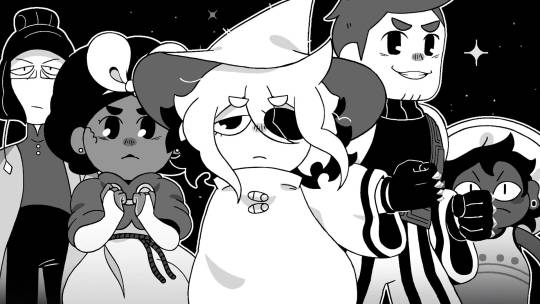
In Stars and Time is a time loop game where you play as Siffrin, the rogue of a party at the end of their quest to save the day by defeating the King, who is freezing everybody in time! But something is wrong: every time you die, you loop back to the day before you fight the King. You're the only one who remembers the loops, so it's up to you to figure out why it's happening, and how to break out.
In Stars and Time is a heart-wrenching dive into mental health, friendship, and love. It's about feeling alone, and how awful it is when the people who love you don't notice (and how awful it is when they do). It's about falling deeper and deeper into your worst self and your worst tendencies, and how to come back from it.
The creator also did one of my favorite Disco Elysium comics ever, which is only tangentially relevant but worth mentioning.
Roadwarden
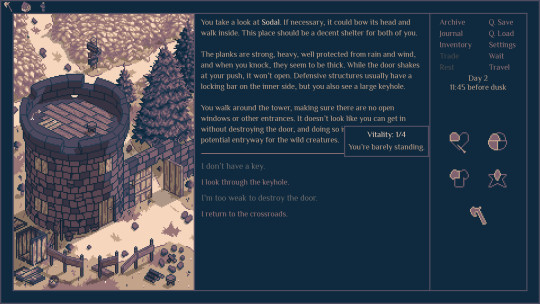
In Roadwarden, you play as the titular Roadwarden for an undeveloped and "wild" part of the kingdom. Monsters roam the forests and roads, and it's your job to keep people safe. On paper, anyway. Your real mission is to find out what is of value in the area, and how to take it from its people. How well you perform this task is up to you. It's an oldschool text-based RPG, and I take a lot of notes by hand when I play.
Roadwarden explores exploitation and industrialization by making you look in the face of your potential victims. You can only learn what your bosses want you to report on by getting close to the residents, after all. There are mysteries to be solved, secrets to be gathered, and hearts to win.
The Longing
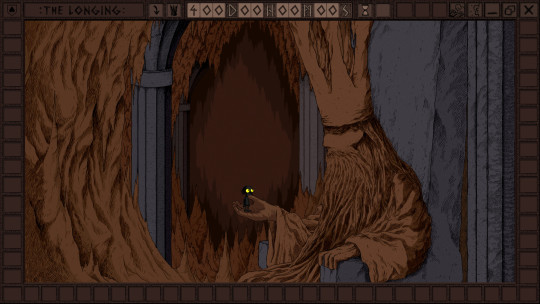
The Longing is an adventure-idle game where you play as the solitary servant of a sleeping king. Your task is to wait for him, for four hundred days. Time in the game passes in realtime (for the most part). There are caves to explore, books to be read, and drawings to make.
The Longing is about loneliness and depression. It's about whether or not you decide to stay in that hole, and if you do, what you do with yourself while you're there. Maybe you'll wander. Maybe you'll stare at a wall. Maybe you'll just sleep until it's all over.
Papers, Please
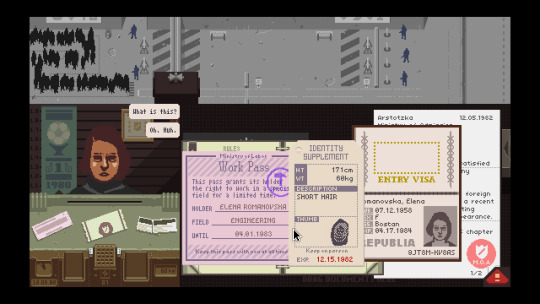
Papers, Please casts you as a newly hired customs officer in a country that is rapidly tightening its borders as its fascist government tightens its fist. This game is stressful. Sometimes you intend to help out the revolutionaries when they asked, but then you got so stressed out trying to make your quota so you can feed your family and pay your bills that you didn't notice the name of the person they were hoping to contact while going through their papers. Sometimes someone puts a bomb in front of you and expects you to defuse it. Sometimes someone suggests you steal people's passports so you can get your family out, and with the horror you see daily, the idea tempts you more than you'd like.
Papers, Please is all about hard choices and testing your moral fortitude. Everything you do has consequences. Being a good person in this game is hardly ever rewarded, but not in a way that feels overly cynical. Papers, Please asks you what kind of person you want to be and what you're willing to sacrifice to get there.
The Return of the Obra Dinn
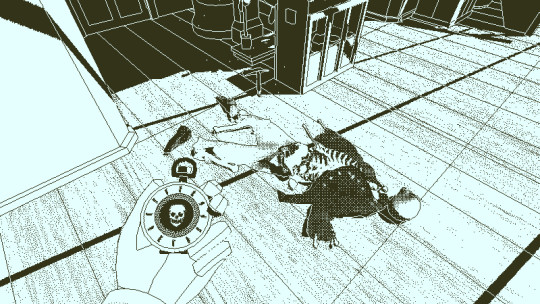
From the creator of Papers, Please, The Return of the Obra Dinn is a game where you play as an insurance investigator for the East India Trading Company. The ship the Obra Dinn has just floated back into port, its entire crew missing or dead. It's your job to figure out what happened aboard the vessel. For insurance reasons.
I don't know how to go into the themes of this too deeply without giving away too much, but the mechanics of the game itself make the game worth playing. You have a magic stopwatch that allows you to go back to the moment of a person's death, allowing you to try and figure out who (or what) killed them, and how. And the soundtrack is extremely good.
Outer Wilds

In Outer Wilds you play as an unnamed alien, and it's your first day going to space! Your planet's space program is pretty new still, so there's still lots to explore and discover on the planets within your system. There are ancient ruins from a mysterious race that once lived in your system, long before your species began to record history. Why were they here? Where did they go? How are they connected to the weird thing that keeps happening to you?
The fun of Outer Wilds is in the discovery and answering your own questions. The game never tells you where to go, and it never outright tells you anything. There are clues scattered through the system, and it's up to you to put them together and figure out your next steps. It's about the way that life always goes on, no matter what, even when it seems like the end of everything, forever. I'd recommend NOT reading anything else about this game. Just go play it. Seriously, the less you know, the more fun this is.
If on a Winter's Night, Four Travelers
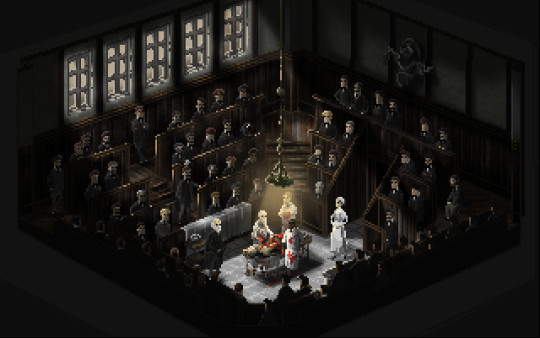
In If on a Winter's Night, Four Travelers, you explore the circumstances of the deaths of four individuals.
This is a short one that took me about two and a half hours to play. If for no other reason, play it for the stunning pixel art. The game explores sexism, racism, and homophobia in the Victorian era and leans heavily into horror themes. Best of all: it's completely free!
Pentiment
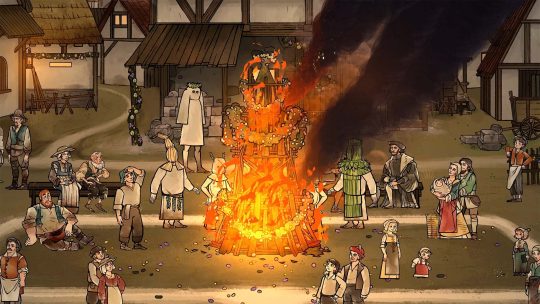
Pentiment takes you to the 16th century, where you take the role of Andreas Maler, a journeyman artist working on his masterwork in the scriptorium of an abbey. When someone is murdered, Andreas takes responsibility for finding the culprit.
The game is set over 20~ years and you get to watch how Andreas' actions affect the village in various ways (who's alive the next time you come by, have people gotten married and had children...). It's an exploration of how the past affects the future, and what parts of that past we choose to keep or discard. It has beautiful art, and fans of both Disco and Pentiment often compare them.
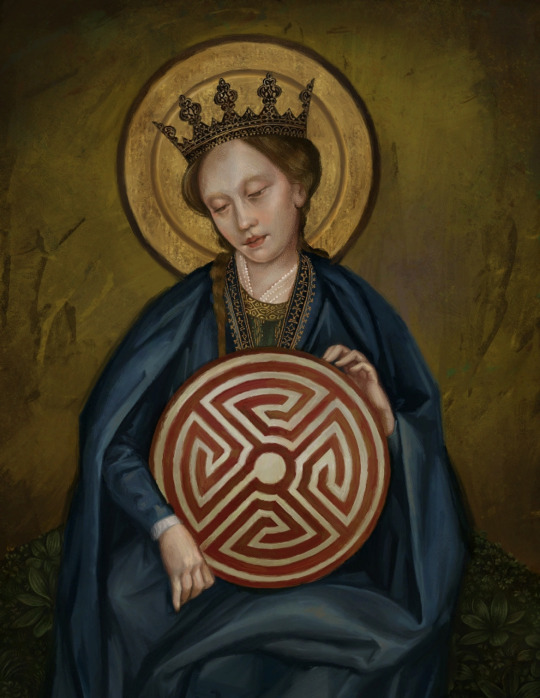
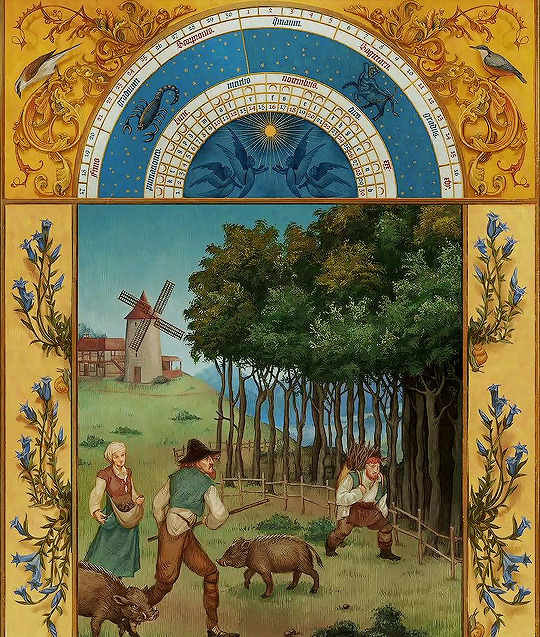
Other games you might wanna check out
Night in the Woods, Dredge, Oxenfree, A House of Many Doors, Inscryption, Slay the Princess, Citizen Sleeper, Chants of Sennar, Loop Hero, The Cosmic Wheel Sisterhood, The Pale Beyond, Where the Water Tastes Like Wine, Elsinore, Her Story, Before Your Eyes, Pathologic (not delved into above because the venn diagram of Pathologic fans and Disco fans is basically a circle)
#disco elysium#pentiment#outer wilds#in stars and time#roadwarden#if on a winters night four travelers#papers please#the return of the obra dinn#the longing#video games#hoping so badly there are no glaring errors in this#made this because i have spoken to many people who Dont Play video games but liked disco
2K notes
·
View notes
Text
Online Banking Exam Preparation | Ujjwal Source
Best Online banking exam preparation has become an essential aspect for individuals who aim to pursue a career in the Indian banking sector. The Indian banking system is one of the largest and most complex in the world, and as such, requires candidates to possess a solid understanding of its policies and practices. With the emergence of online platforms, the process of preparing for these exams has become easier and more accessible.

#Online Banking Exam Preparation | Ujjwal Source#best online classes for ssc cgl#ssc cgl reasoning practice set online#classification reasoning for ssc cgl#best coaching for ssc#best coaching for competitive exams in india#competitive exams#best online classes for ssc#books & libraries#ssc coaching in india#ssb coaching in india#Banking Exam Preparation
0 notes
Text
do y'all think that the boys do different sex positions depending on where you are for a mission
you're in paris trying to catch hold of someone or some intel and before you can catch sight of the Eiffel tower gaz and john pull you into an alley way to try the Eiffel Tower sex position. You cum when the tower starts glittering at night.
you're in India, and sitting with simon reading over files. johnny brings in a book listing the theories behind kama sutra and the best positions- and all of a sudden you can't walk or really move without wincing for days.
you're in cowboy country- somewhere in the deep south of the US when the boys have you trying cowgirl, reverse cowgirl, and even make a lasso to hold your arms to your sides and leave you almost helpless to ride their cocks. (you and johnny- the competitive bastard- see who can ride who faster... he's on simon, you're on gaz, and price is standing there with his cock out while you and johnny make out over the head of him)
you're setting up a sniper position in the dessert somewhere, and simons got your pants shoved down beneath your ass, and your hips supported with extra stealth coverings, and you've all but abandoned setting up because you can't get a straight shot with him rutting into anyways (you shoot the target and feel simons cum soak the gusset of your panties)
you're at a pig roast- it's some weird base bonding activity the higher ups set up. and you feel john and gaz come to stand with you- heat in their eyes and ghost and johnny finally catch on. simon huffs out "you did the eiffel tower in paris- didn't you" and johnny all but WHEEZES watching the heat rise to your face and your eyes have sudden interest in the ground. johnny wipes tears form his eyes and says "bonnie- HAH- we'll uh, haha, we'll spit roast ya now yer back home, aye?"
#LOSING IT AT THIS HC LMAO#THEY SO DO THIS#poly!141 x reader#poly 141 x reader#poly141 x reader drabble#141 x reader#141 x reader drabble#johnny soap mactavish#johnny soap mctavish x reader#johnny mactavish#soap x reader#simon ghost x you#simon ghost riley#simon ghost riley x reader#simon riley x reader drabble#john price x reader drabble#john price x reader smut#gaz x reader#kyle gaz garrick#kyle garrick x reader#jesus christ tagging is so tedious
1K notes
·
View notes
Text
One of my favorite adventures from my twenties was a trip I took alone up to Canada. Neil Gaiman was doing a reading for the release of Ocean at the End of the Lane, and I was living three hours south of the venue.
None of my friends could make it and it was before I had GPS but I decided to go by myself. The day before the event I had nightmares about being lost in Canada, but I woke up and still got in the car.
The drive was awful, and I clutched the printed out Mapquest directions like my life depended on it, lurching through stop and go traffic with my manual transmission car. But when I arrived I found parking easily. I had tried to be there early but between traffic and the border crossing I was barely on time.
When I got to the door it turned out there wasn’t any seating left. My face fell, and the lovely worker refused to let me go away disappointed. She snuck me into the area reserved for staff to watch the event.
I sat oddly isolated in the very back row, listening to Neil’s calm narration. Midway through a boy my age came over to join me. We chatted while the line moved to get things signed. He lived in China, and India, went to school in Scotland, and was here couch surfing just for this event.
He asked about my YouTube channel and I laughed and said I didn’t have one. He paused in confusion and said, “You should, you’re such a gifted storyteller!” Later his certainty that I had one made me imagine he was a multidimensional traveler and this iteration of me didn’t have a channel that he was familiar with on his world.
I got my copy of the book signed and we left together. We wandered the city at night, making our way toward the ocean. We were both surprised to have our way blocked not once but three times by skunks, wandering blithely through the metropolis.
We clambered over the breakers by the water, watching the boats and listening to the waves crash at our feet. I offered him a lift back to his couch and he agreed.
I got lost trying to find the way home, well off my printed directions. My nightmare had come true, but at 2am lost in a foreign city I had a feeling of serenity that everything would be okay.
I pulled up next to some mildly intoxicated guys walking along, asking if they knew the way. Later, relaying this story to my wife they were appalled by this decision. But a moment later a cop car interrupted us, clearly thinking something illegal was transpiring. I flashed my dimples and asked for directions and he set me back on the right path.
I only spent one night carousing, but I still think about that boy, hoping he’s doing well. I remember the surreal peace of the sleeping city, full of skunks and waves on the breakers.
#ramblies#story#writing#I know that he asked me for a kiss down by the water#but I can’t remember if I gave him one#I don’t think so but I might have just for the laugh and the night of adventure
716 notes
·
View notes
Note
hey you might've been asked this before sorry if so, but have you read or do you have any thoughts on A short history of Trans Misogyny?
I have read it! I have a few thoughts.
I think it's a strong and important work that compiles historical archives into sharp analyses of how "trans misogyny" (using Jules Gill-Peterson's spacing) is not a recent phenomenon but a globalized structure with centuries of history. I also think it's flawed, for reasons I'll get into after a quick summary for those who haven't had the chance to read it yet.
JGP divides the book into three main chapters, the first on the notion of "trans panic". There, she traces how variants of this anxiety with the trans-feminized subject have presented—to deadly effect, for the subject—in such different settings as early colonial India, the colonization of the Americas, the racialized interactions between US soldiers stationed in the Philippines and the local trans women living there, and of course the contemporary United States itself. In every case she analyzes this "panic" as the reaction of the capitalist colonial enterprise to the conceptual threat that the trans-feminized subject poses; we are a destabilizing entity, a gender glitch that undermines the rigid guarantees of the patriarchal order maintaining capitalism. Punishment follows.
The second chapter is my favourite, and considers the relationship between transfeminine life and sex work. I posted a concluding excerpt but the thrust of the chapter is this: that the relegation of so many trans women and trans-feminized people to sex work, while accompanied by the derogation and degradation that is associated with sex work, is not itself the mere result of that degradation inflicted upon the subject. In other words, it is not out of pure helplessness and abjection that so many trans-feminized people are involved in sex work. Rather, sex work is a deliberate and calculated choice made by many trans-feminized people in increasingly service-based economies that present limited, often peripheralized, feminized, and/or reproductive, options for paid labour. Paired with a pretty bit of critical confabulation about the histories of Black trans-feminized people travelling the US in the 19th century, I think this made for great reading.
In her third chapter, JGP narrativizes the 20th century relationship between the "gay" and "trans" movements in north america—scare quoted precisely because the two went hand-in-hand for much of their history. She emphasizes this connection, not merely an embedding of one community within another but the tangled mutualism of experiences and subjectivities that co-constituted one another, though not without tension. Then came the liberal capture of the gay rights movement around the 70s, which brought about the famous clashes between the radicalisms of Silvia Rivera and Marsha P Johnson (neither of whom, JGP notes, ever described themselves as trans women) and the institutions of gay liberalism that desired subsumption into the folds of capital. This is a "remember your history" type of chapter, and well-put.
I think JGP is correct to insist, in her introduction, on the globalizing-in-a-destructive-sense effects of the colonial export of trans womanhood. It is, after all, an identity conceived only mid-century to make sense of the medicalized trans subject; and "gender identity" itself (as JGP describes in Histories of the Transgender Child) is a psychomedical concept conceived to rein in the epistemic instability of trans existence. This is critical to keep in mind! But I also think JGP makes a few mistakes, and one of them has to do with this point.
In her first chapter, under the discussion of trans misogyny in colonial India, JGP of course uses the example of the hijra. Unfortunately, she commits two fundamental errors in her use: she mythologizes, however ambiguously, the "ascetic" lives of hijra prior to the arrival of British colonialism; and she says "it's important to say that hijras were not then—and are not today—transgender". In the first place, the reference to the "ascetism" of hijra life prior to the violence of colonialism is evocative of "third-gender" idealizations of primeval gender subjectivities. To put the problem simply: it's well and good to describe the "ritual" roles of gendered subjects people might try to construe contemporarily as "trans women", the priestesses and oracles and divinities of yore. But it is best not to do so too loftily. Being assigned to a particular form of ritualistic reproductive labour because of one's failure to be a man and inability to perform the primary reproductive labour of womanhood-proper is the very marker of the trans-feminized subject. "Ascetism" here obviates the reality that it wasn't all peachy before (I recommend reading Romancing the Transgender Native on this one). Meanwhile, in the after, it is just wrong that hijra are universally not transgender. Many organize specifically under the banners of transfeminism. It's a shame that JGP insists on keeping the trans-feminized life of hijra so firmly demarcated from what she herself acknowledges is globalized transness.
My second big complaint with the book is JGP's slip into a trap I have complained about many times: the equivocation of transfemininity with femininity (do you see why I'm not fond of being described as "transfem"?). She diagnoses the root of transmisogyny as a reaction to the femininity of trans women and other trans-feminized subjects. In this respect she explicitly subscribes to a form of mujerísima, and of the trans-feminized subject as "the most feminine" and (equivalent, as far as she's concerned) "the most woman". Moreover, she locates transfeminist liberation in a singular embrace of mujerísima as descriptive of trans-feminized subjectivity. As I've discussed previously, I think this is a misdiagnosis. Feminization is, of course, something that is done to people; it is certainly the case that the trans-feminized subject is in this way feminized for perceived gender-failure. This subject may simultaneously embrace feminized ways of being for all sorts of reasons. In both cases I think the feminization follows from, rather than precedes, the trans misogyny and trans-feminization, and there is a fair bit of masculinization as de-gendering at play too, to say nothing of the deliberate embrace of masculinity by "trans-feminized" subjects. Masculinity and femininity are already technologies of gender normalization—they are applied against gender deviation and adapted to by the gender deviant. The deviation happens first, in the failure to adhere to the expectations of gender assignment, and I don't think these expectations can be summarized by either masculinity or femininity alone. I think JGP is effectively describing the experience of many trans-feminized people, but I do not think what she presents can be the universalized locus of trans liberation she seems to want it to be.
Now for a pettier complaint that I've made before, but one that I think surfaces JGP's academic context. In her introduction she says:
In truth, everyone is implicated in and shaped by trans misogyny. There is no one who is purely affected by it to the point of living in a state of total victimization, just as there is no one who lives entirely exempt from its machinations. There is no perfect language to be discovered, or invented, to solve the problem of trans misogyny by labeling its proper perpetrator and victim.
Agreed that "there is no perfect language to be discovered"! But JGP is clearly critical of TMA/TME language here. Strange, then, that less than ten pages later she says this:
this book adds the phrase trans-feminized to describe what happens to groups subjected to trans misogyny though they did not, or still do not, wish to be known as transgender women.
So JGP believes it is coherent to talk about "groups subjected to trans misogyny", which she thinks consists of the union of trans women and what she called "trans-feminized" groups. If this is to be coherent, there must be groups not subjected to trans misogny. So we've come around to transmisogyny-subjected and not transmisogyny-subjected. Look: you cannot effectively theorize about transmisogyny without recognizing that its logic paints a particular target, and you will need to come up with a concise way of making this distinction. But JGP dismissing TMA/TME with skepticism about "perfect language" and immediately coining new language (basically TMS/not TMS) to solve the problem she un-solved by rejecting TMA/TME... it smells of a sloppy attempt to make a rhetorical point rather than theoretical rigour. It's frustrating.
I have other minor gripes, like her artificial separation of "trans women" from "nonbinary people" (cf. countless posts on here lamenting the narrow forms of existence granted TMA people if we want recognition as-such!) or her suggestion that "a politics of overcoming the gender binary" is mutually exclusive from rather than necessarily involved with struggles around "prison abolition, police violence, and sex work". Little things that give me the sense of theoretical tunnel-vision. But I don't think all this compromises the book's strengths as a work of broad historical analysis. I would simply not take every one of its claims as authoritative. Definitely give it a read if you have the chance, especially for the second and third chapters.
#ask answer#jules gill-peterson#(i haven't been asked this before ty for asking <3 🐐)#note that this was mostly off the cuff except what i had taken pictures of bc i left the book in toronto for my mom to read
540 notes
·
View notes
Text
I can't believe I'm actually having to argue with people about this, but yes, the Official and Ineffable adaptation of the GOOD OMENS novel into a graphic novel is actually OFFICIAL, like as in very official and real, and I am not some ne'er do well absconding with rights I don't have rights to.

I am working as the hire of the Terry Pratchett estate and Neil Gaiman. I didn't grab the book and run away with it, and make comic book pictures unbidden.
The Kickstarter launches today. The Terry Pratchett Estate is self publishing it through their company Dunmanifestin.
All of this is very easy to research on the internet. Because there are lots and lots of articles about it.
Like these.
https://www.thebookseller.com/news/pratchetts-and-gaimans-good-omens-to-be-adapted-into-a-graphic-novel?fbclid=IwAR385gG5SyD-IjBTLFkGzMRQEE2EEwvFBKgHCZU1aX6QgXfz-iMELxj589o
I've adapted a number of works by Neil Gaiman and have won some nice awards doing that, which is also easy to research.
The Kickstarter launches today at 12 EST.
I really appreciate that people are passionate about this, but I am also passionate about it and am very happy to be working on it.
It is not an adaptation of the show. It is an adaptation of the novel.
Thank you.
1K notes
·
View notes
Text
Queer Adult SFF Books Bracket: Round 2
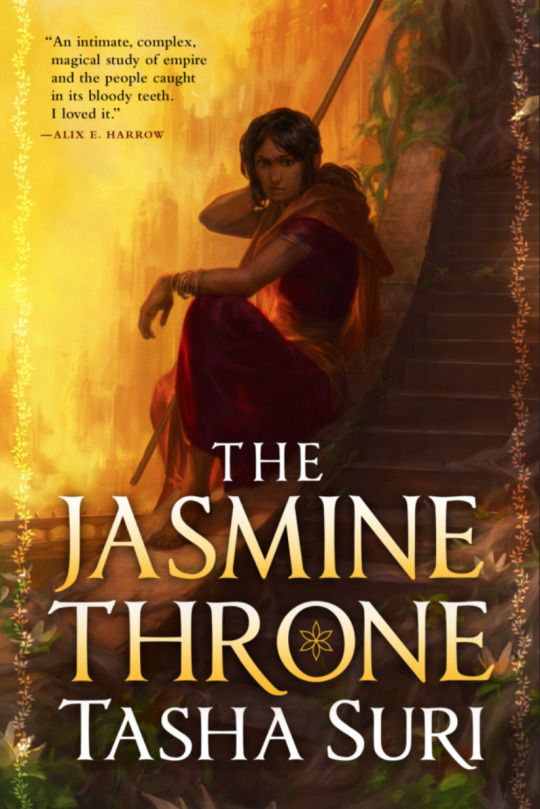

Book summaries and submitted endorsements below:
The Burning Kingdoms series (The Jasmine Throne, The Oleander Sword, The Lotus Empire) by Tasha Suri
Author of Empire of Sand and Realm of Ash Tasha Suri’s The Jasmine Throne, beginning a new trilogy set in a world inspired by the history and epics of India, in which a captive princess and a maidservant in possession of forbidden magic become unlikely allies on a dark journey to save their empire from the princess’s traitor brother.
Imprisoned by her dictator brother, Malini spends her days in isolation in the Hirana: an ancient temple that was once the source of the powerful, magical deathless waters — but is now little more than a decaying ruin.
Priya is a maidservant, one among several who make the treacherous journey to the top of the Hirana every night to clean Malini’s chambers. She is happy to be an anonymous drudge, so long as it keeps anyone from guessing the dangerous secret she hides.
But when Malini accidentally bears witness to Priya’s true nature, their destinies become irrevocably tangled. One is a vengeful princess seeking to depose her brother from his throne. The other is a priestess seeking to find her family. Together, they will change the fate of an empire.
Fantasy, epic fantasy, politics, secondary world, series, adult
Running Close to the Wind by Alexandra Rowland
Endorsement from submitter: "Utterly hilarious romp. No actual sex, but somehow hornier than 90% of books with actual sex in them that I have read."
Avra Helvaçi, former field agent of the Araşti Ministry of Intelligence, has accidentally stolen the single most expensive secret in the world―and the only place to flee with a secret that big is the open sea.
To find a buyer with deep enough pockets, Avra must ask for help from his on-again, off-again ex, the pirate Captain Teveri az-Ḥaffār. They are far from happy to see him, but together, they hatch a plan: take the information to the isolated pirate republic of the Isles of Lost Souls, fence it, profit. The only things in their way? A calculating new Araşti ambassador to the Isles of Lost Souls who’s got his eyes on Avra’s every move; Brother Julian, a beautiful, mysterious new member of the crew with secrets of his own and a frankly inconvenient vow of celibacy; the fact that they’re sailing straight into sea serpent breeding season and almost certain doom.
But if they can find a way to survive and sell the secret on the black market, they’ll all be as wealthy as kings―and, more important, they’ll be legends.
Fantasy, humor, adventure, secondary world, queernorm, adult
#polls#queer adult sff#the burning kingdoms#tasha suri#the jasmine throne#the oleander sword#the lotus empire#running close to the wind#alexandra rowland#avra helvaci#rcttw#chantiverse#books#booklr#lgbtqia#tumblr polls#bookblr#book#lgbt books#queer books#poll#sff#sff books#queer sff#book polls#queer lit#queer literature
118 notes
·
View notes
Text
Okay, I lied. One last post before I take that much needed mental health break.
A post that I always swore - back before you could turn off reblogs and mute comments and basically make the lives of would be trolls very pointless, because you will never see what they say - I would never be stupid enough to make.
I leave you with my essay on…
Why Sparkly Vampires Make Perfect Sense, Stephanie Meyer Just Went About It All Wrong
Let's face it, humans don't always know what we're looking at. As an example, I was reading a book about poison use in royal courts. In the section on cures, in the subsection on unicorn horn (alicorn, for the technical term), it mentioned how the people who procured this rare substance were somewhat baffled by the fact that at the end of their lives the unicorn (which lived in such places as Africa, Persia, India, etc.) would migrate to the far north to die on the beaches of the arctic sea. Now, in their defense, it's very unlikely that any of these individuals would be well traveled enough to have even the opportunity to see both a live unicorn and a dead one. If they had, they might have had an easier time realizing 'these are two different animals!'. But the point still stands.
Humans don't always know what we're looking at.
Now, if you go through folk lore and mythology, you will, of course, find horrible blood sucking fiends that drain innocents of their life. Vampires. You will also find lots of entities which emit an ethereal luminescence or radiant glow, entities which possess powers beyond mortal understanding, who can be benign or terrible, and who are known to abscond with humans, although we're certain these humans are safe and happy on Olympus or under the green hill, not dead like they'd be with those blood suckers.
No one who had not seen both Apollo, God of the Sun, and the horrible vampire who chowed down on the neighbor two doors down would realize: they're the same entity.
To make it even harder for the poor mortals (and easier for the vampires!), vampires look different in different lighting conditions. After all, something that sparkles in the sunlight will also sparkle in the moonlight, the firelight, etc., it's just a matter of degrees. So some vampires would hang out in moonlit glens, for that 'fairy of the moonlight' feel, while others would set themselves up in temples with a many fires as they could manage. I mean, if you're going to call yourself Apollo, God of the Sun, you had better be all sparkle all of the time! Top all of this off with mind reading ability that lets traveling vampires fit into the local not-vampire-vampire mythos and yeah, the humans don't stand a chance.
It's great! Things are wonderful! Even if someone does see you devour a hapless victim and run screaming 'vampire' in the town, you can always just eat them next. No big deal. Only the stupid and careless are in real danger.
And then…
CALAMITY!
The head of the Roman Empire, that militant mass of well armed testosterone (and a bunch of less important people), converts to Christianity and proclaims there's only one god who is…not you.
Well shit.
Of course, if you're a lesser known vampire you can pass yourself off as an "Angel of the Lord" in a quick pinch, as long as you're talking to a peasant who's too illiterate to realize you're lacking in the eye and wing department (good news - this is most everyone), but you can't do that too often. And if everyone knows you as Apollo, God of the Sun?
Sucks to be you. You now have a bunch of very militant fundamentalists armed with sharp, pointy implements of destruction chasing after you with cries of 'demon' and 'false god'. Even with your supernatural speed, getting away from them is made far more difficult by the fact they can see you glittering from the other side of the market.
This is where vampires went nocturnal, since moonlight is less sparkle inducing than the sun. Then, since even that gets risky, they slowly moved into caves and cemeteries and the occasional creepy old castle that no sane person would enter without an explicit invitation to dinner, or for a real estate job. Something like that.
The next millennium was pretty dire. The millennium after that was…okay, also pretty dire, until suddenly, at the end of the twentieth century, a miracle! A remarkable shift brought about a change that would once again free vampires from their castles and cemeteries and allow them to walk safely among humans!
But they wouldn't go creeping off to the sun starved, water logged boonies of the Olympic rain forest. Oh hell no! They would go to the cities, to Soho, to Broadway, to places where they could strut proudly down the street to the envious stares of mortals and cries of "Damn, I wish I looked that good in body glitter!"
235 notes
·
View notes